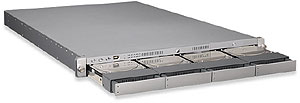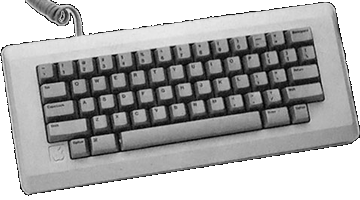Xserve

Essentials
Family: Servers
Codename: ?
Gestalt ID: 406
Minimum OS: 10.1.5
Maximum OS: 10.5.8
Introduced: May 2002
Terminated: March 2003
Processor
CPU: PowerPC 7455 "G4"
CPU Speed: 1.0/2x 1.0 GHz
FPU: integrated
Bus Speed: 133 MHz
Register Width: 32-bit
Data Bus Width: 64-bit
Address Bus Width: 32-bit
Level 1 Cache: 32 kB data, 32 kB instruction
Level 2 Cache: 256 kB on-processor
Level 3 Cache: 2 MB DDR SDRAM per-processor
ROM: 1 MB ROM + 3 MB toolbox ROM loaded into RAM
RAM Type: PC2100 DDR
Minimum RAM Speed: 266 MHz
Onboard RAM: 0 MB
RAM slots: 4
Maximum RAM: 2.0 GB
Expansion Slots: 2 64-bit 66 MHz PCI, 32-bit 66 MHz PCI/AGP
Video
GPU: ATI
VRAM: 32 MB
Max Resolution: all resolutions supported
Video Out: VGA
Storage
Hard Drive: 60 GB 7200 RPM (4 hot-pluggable bays, up to 480 GB)
ATA Bus: 4x Ultra ATA-100
Optical Drive: 24x CD-ROM
Input/Output
USB: 2
Serial: DB-9
Firewire: 3
Speaker: mono
Networking
Ethernet: 2x 10/100/1000Base-T
Miscellaneous
Power: 400 Watts
Dimensions: 1.73" H x 17.6" W x 28" D
Weight: 26 lbs.

Announced in May 2002, the Xserve marked Apple's first major push into the server market since its ill-fated Network Servers. While Apple had sold server versions of various PowerMacs, the Xserve was the first Apple machine specifically designed for the server market in years.
The Xserve was the first Apple machine to include Double Data Rate RAM, and had an innovative hard drive scheme: four hot-pluggable bays, each running on its own UltraATA-100 bus, accepted special Apple drive modules (available in 60 or 120 GB each) for a maximum of 480 GB of storage. The Xserve came with 2 Full length 64 bit 66 MHz PCI cards, along with a combination 32 bit 66 MHz PCI/4x AGP slot. In standard configurations, the 32 bit PCI slot was filled with a server-grade ATI VGA graphics card, while one of the 64 bit slots held a Gigabit Ethernet card.
The Xserve had a second Gigabit Ethernet port onboard, along with 3 Firewire ports, 2 USB ports, a serial port for a direct terminal connection, and a tray-load 24x CD-ROM drive.
The most remarkable feature of the Xserve was its rackmount case. Just 1U (1.75") thick, The Xserve case was a remarkable feat of engineering. The four drive bays were accessable via the front panel, as was one of the firewire ports, and the CD-ROM drive. Multicolored display lights on the front panel showed drive access, processor load, and ethernet link status. The Xserve was targeted at the Enterprise and Educational server markets, and was available in two configurations. The low-end model, with a single 1.0 GHz processor, a 60 GB hard drive, and 256 MB of RAM was $2999. The high-end model, with dual 1.0 GHz processors, 512 MB of RAM, and a 60 GB hard drive was $3999. Both models included an unlimited-license version of Mac OS X Server 10.2 "Jaguar".
Picture Credits:
Apple, Inc.
